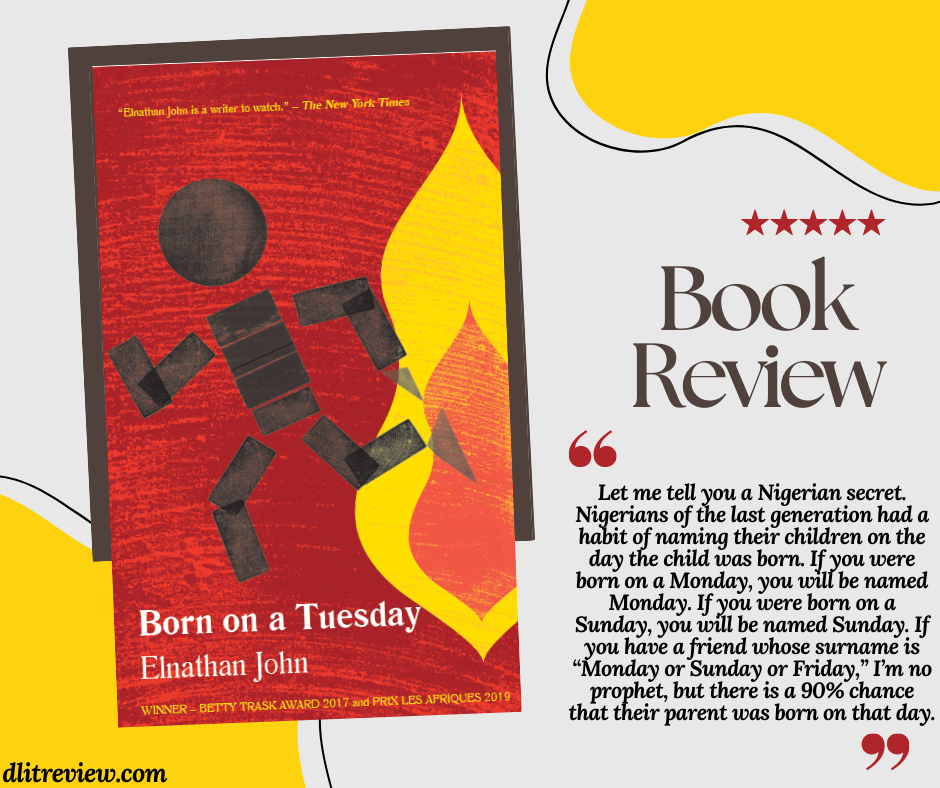“Life is not fair.” Elnathan John‘s “Born On A Tuesday” is a reminder of that maxim.
Let me tell you a Nigerian secret. Nigerians of the last generation had a habit of naming their children on the day the child was born. If you were born on a Monday, you will be named Monday. If you were born on a Sunday, you will be named Sunday. If you have a friend whose surname is “Monday or Sunday or Friday,” I’m no prophet, but there is a 90% chance that their parent was born on that day.
The Hausas took this higher. In English, just three days easily pass for a person’s name, Monday, Friday, or Sunday. In Hausa, you could be named for any day of the week. And that is how our major character got his name “Dantala,” which means “Born On A Tuesday.”
Dantala’s life is a chronicle of ups and downs. Despair and hope and then despair. He was born into a poor family. His mother sent him off to an Islamic school. While there, he fell into street life, a state of living called “Almajiri.” Dantala became friends with another Almajiri, Gobedanisa.
Theirs became a life of struggle for basic survival. They lived under a tree. A major feature of their life is elections. Not that they are being involved in the key process of democratic elections, to vote and be voted for, no, their engagement is far from it: political violence.
They are paid by political parties to cause violence. The highest bidder gets their service. After one election in which they caused violence and attacked the party offices, Gobedanisa was killed. Dantala was deeply involved in the violence that happened.
After seeing his friend die, he couldn’t bear to live in Bayan Layi again. He begins his journey home, changing his life for good. He encountered a Sheikh who took him under his wings. Because he knew Arabic, the Sheikh understood that Dantala held a promise.
Under Sheikh, he meets with different boys, some of whom he hates and one who he loves dearly, Jibril. Jibril taught him English. By applying himself to learning, his whole life is transformed for the better. His life was so good; he couldn’t believe it.
But the tragedy is not too far from Dantala. It always hounds him. When he returned home the first time, he learned his mother had watched her two daughters die in a flood, and she never recovered. She lived the rest of her life in silence until she joined them too.
His brothers had joined a new notorious branch of radical Islamic groups. At first, he shrugged at them and couldn’t understand why they made this choice. Little did he know this group would change his life profoundly.
Living with Sheikh refines Dantala. Sheikh exposed him to everything. He was a future leader in training; Sheikh told him so. But all of this was not to be. The radicalization he had once heard about from a distance came to him. His city became engulfed in the disagreement. It began with debates and reasonable disagreements but soon became violent.
One time, Sheikh is attacked by the radicals and killed. His followers retaliated, and the whole city was engulfed in violence that soldiers had to intervene to return calm. Dantala was arrested in the process of escaping. For the next few months, the military would torture and question him with the hope that he would betray his friend Jibril. Dantala refused to betray his friend.
Dantala’s resolve in the face of torture to refuse to betray his friend touched my heart. It was as though this man who had experienced so much tragedy still understood the value of friendship. After a very long time in prison, he is released. When he returns to his city, everyone considers him a madman, and no one recognizes him. He is back to where he started.
In “Born On A Tuesday,” the story of Dantala is the story of an individual, but this is the story of Nigeria. This is the story of a society that has refused to take care of the least among us. It is an indictment of the elite and the ruling class, as shown in the lives of the clerics and the politicians.
The Nigerian ruling class is a group of selfish, greedy, pot-bellied men who will do anything to obtain power. They intentionally refuse to develop their population and consistently weaponize the penury of their subjects as a political tool. For these pot-bellied fellows, everything is a tool for achieving their goal of obtaining power; they will stop at nothing to get it.
This book is a work of fiction, but I insist that it is a true story, for I know Almajiris, and I have seen how some of them have been weaponized in the crisis that has engulfed my city, Jos, in the past few years.
So, life isn’t fair, but often it isn’t fair because a few people choose to make the lives of others miserable by their actions and inaction. The good thing is that this is a human problem; humans can solve human problems.
Born on a Tuesday is a great story. The greatness of Elnathan John’s narrative abilities is not overrated. He never disappoints. He has told an uncomfortable story in a way you can easily read and understand. I rate Born on a Tuesday a 5/5.

